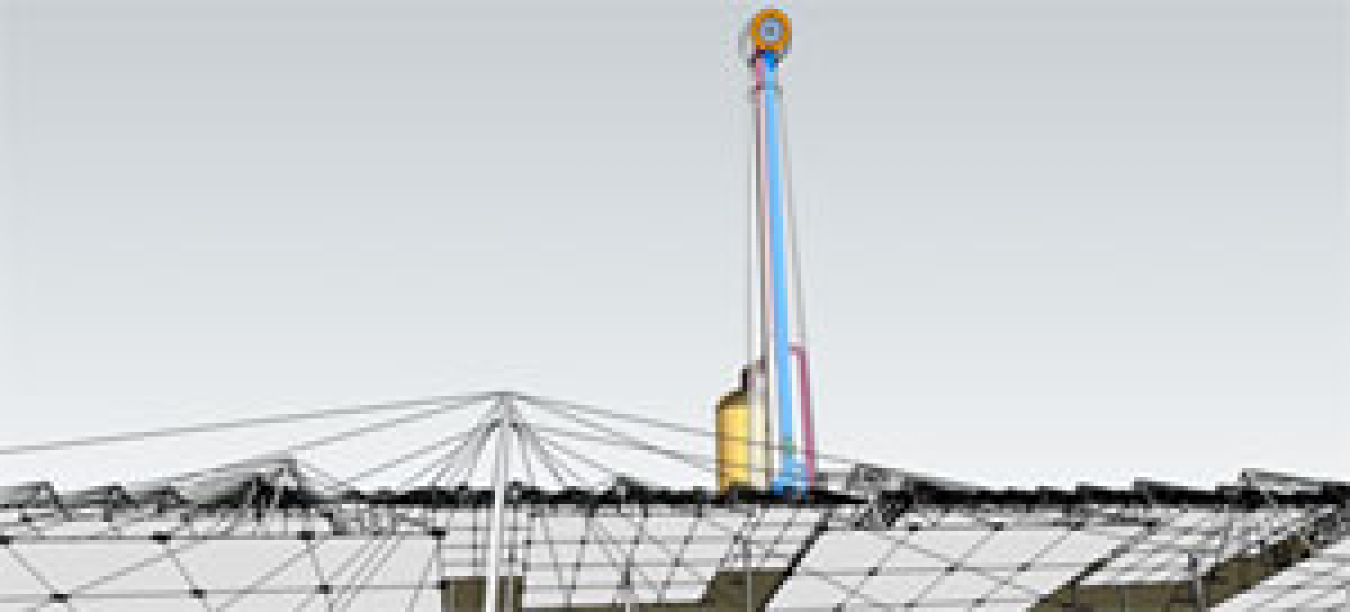-- This project is inactive --
Wilson Solarpower, under the Baseload CSP FOA, proposed a utility-scale, Brayton cycle baseload power tower system with a capacity factor of at least 75% and LCOE of $0.09/kWh.
Approach
Wilson developed, built, tested, and evaluated two prototype components—an unpressurized thermal storage system and an unpressurized solar receiver—as well as a full Brayton cycle system that includes these components. The goal of the project was to identify an optimally sized, Brayton cycle baseload power tower system module of at least 100 kilowatt electrical and to evaluate a single-system module.

Wilson Solarpower is developing a baseload CSP system to be competitive with conventional power generation.
Innovation
This project took a modular approach to CSP power towers using a small Brayton cycle turbine power block that could be shipped to a worksite. Key components include:
- A high temperature ceramic turbine (50% efficiency)
- A 97.5%-efficient, high-temperature (1200°C), rotary regenerative, ceramic heat exchanger
- An unpressurized solar receiver.
These three items compose the transportable power block. Additional development is possible with an unpressurized thermal energy storage system using dry filler material such as alumina.
Conclusion
Oak Ridge National Laboratory tested the high-performance alloy Haynes HR214 to provide an indication of the potential life of a heat exchanger made of the alloy when operating in Wilson’s CSP system. Over the course of a year, the lab tested a range of foil thicknesses at a range of temperatures through 800 10-hour cycles that simulated operating conditions.
Aluminum loss was measured after exposure using EPMA, and Al consumption rates were calculated based on the difference between the starting Al content and the remaining Al content. At 1000°C-1050°C, the rate was sub-linear with time but not enough data was collected to precisely determine the relationship with time. It was concluded that if the reaction remains parabolic for 100,000 hours (highly unlikely), a 6mm foil may survive for 100,000 hours at 950°C. If the reaction is linear (worst case) a 6mm foil will survive about 25,000 hours at 950°C. Extrapolating to lower temperatures with a linear reaction showed a 6mm foil would likely survive 100,000h at 900°C.
The thermal energy storage system engineered with Saint-Gobain’s NorPro division is the first of such system designed for a Brayton power tower plant. The results of that work will be the basis for finalizing the design.
Final Report
Anderson, Bruce. Brayton-Cycle Baseload Power Tower CSP System. No. DE-EE0003587. Wilson Solarpower, 2013. doi:10.2172/1166984.
Publications, Patents, and Awards
- Anderson, Bruce N., and William Dean Treece. "Multi-thermal storage unit systems, fluid flow control devices, and low pressure solar receivers for solar power systems, and related components and uses thereof." U.S. Patent Application No. 14/387,052.
- "Brayton Cycle Concentrated Solar Power Generation Using a Low Pressure Solar Receiver," PCT International PCT/US2011/052051, Filing Date 16-Sep-2011
Learn about other concentrating solar power research.

